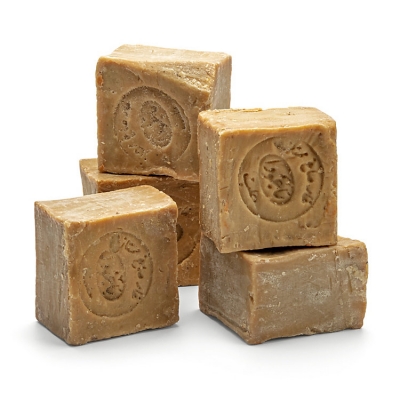
Many historians consider Aleppo soap, known as ‘ghar’ in Arabic and Savon d’Alep in French, as the world’s first bathing soap bar. Part of the ancient Sumerian civilization, Aleppo ranks with Damascus, the Syrian capital, as one of the world’s oldest continuously inhabited cities.
Made by hand, Aleppo soap contains just three ingredients: olive oil and a tincture of caustic soda or lye to solidify the mixture. The result is an intensely moisturizing soap suitable for all skin types, including for babies. Laurel oil is a proven anti-fungal, anti-microbial and anti-inflammatory ingredient.
The shiny black laurel berries are harvested by women in the northern mountains in autumn and winter. The berries are crushed to extract the oil. Once the essential oil has been distilled, it’s mixed with olive oil. The greater the proportion of laurel oil to olive oil, the more expensive the soap. The oil mixture is heated with small amounts of lye until a thick, dark green solution is produced. The solution is poured onto the stone floors of drying chambers beneath each soap factory, forming a thick carpet.
Once the mixture cools and hardens, it is cut into 12.5 cm x 10 cm blocks. Each bar is then stamped with the maker’s mark, as well as the Arabic name of Aleppo. The bars are stacked in a pyramid to dry and cure for several months.
A 225 gm, bar costs from $4 to $10 (Rs 286-716) depending on the laurel oil content.
Picture Credit : Google




